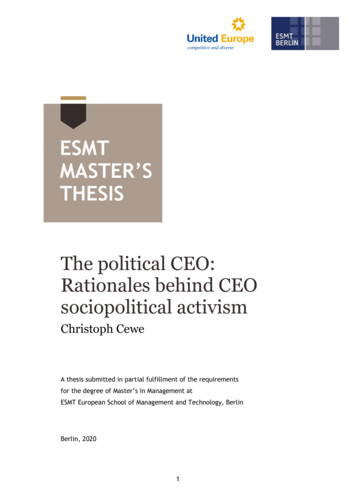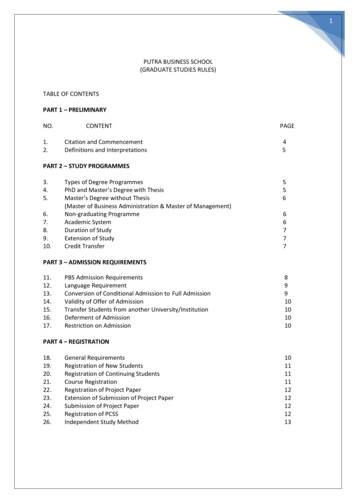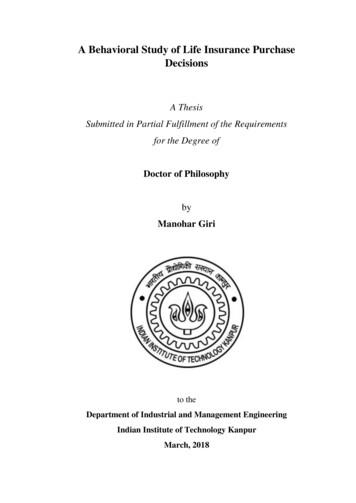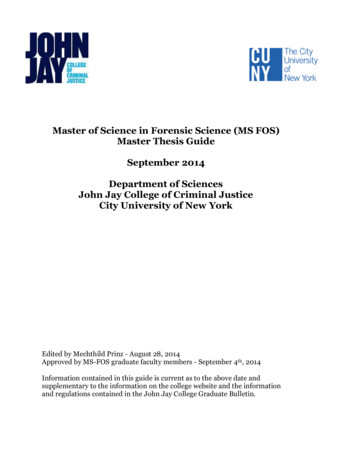
Transcription
ESMTMASTER’STHESISThe political CEO:Rationales behind CEOsociopolitical activismChristoph CeweA thesis submitted in partial fulfillment of the requirementsfor the degree of Master’s in Management atESMT European School of Management and Technology, BerlinBerlin, 20201
About the studyThe objective of the joint European CEO study of ESMT Berlin and United Europe e.V. is touncover the key rationales of European corporate leaders to take a public stance towardssocial and political issues. The research findings are based on an extensive literature review,a quantitative survey of 40 European CEOs of large, predominantly multinational corporations and subsequent qualitative interviews with six survey participants from a variety ofindustries. The present thesis has been conducted by Christoph Cewe under the academicsupervision of Prof. Jörg Rocholl and in cooperation with United Europe e.V.2
Table of contentsAbout the study .2List of tables .4List of figures.4Abstract .51.Introduction .62.Literature review and hypothesis development .82.1.The changing role of business in society .82.2.The increasing expectations from stakeholders towards business . 102.3.CEO activism . 112.3.1.Definition . 112.3.2.The rise of CEO activism . 122.3.3.Potential effects of CEO activism . 142.3.4.Potential rationales behind CEO activism . 182.4.3.Methodology . 223.1.5.Survey . 223.1.1.Population . 223.1.2.Questionnaire design . 233.1.3.Statistical evaluation . 253.1.4.Survey media and data collection . 253.2.4.Research question and hypothesis development . 19Semi-structured interviews . 26Data analysis and empirical results . 274.1.Achieved sample . 274.2.Hypotheses . 28Conclusion . 405.1.Summary . 405.2.Managerial implications . 415.3.Limitations and recommendations for future research. 43References . 45Appendices . 533
List of tablesTable 1: Interview guideline for the semi-structured interviews . 26Table 2: Survey participants by country and company size (as per employee count) . 27Table 3: Survey participants by industry and market focus . 27Table 4: CEOs’ opinion on whether they should take a stand for their political beliefs . 28Table 5: CEOs’ likelihood to take a stance in future . 28Table 6: Boardroom relevance of CEOs’ sociopolitical engagement by CEOs’ opinion .whether political activism should be executed with or without company involvement . 29Table 7: CEOs’ rationales to take a stand on sociopolitical issues . 31Table 8: Pearson’s r correlation coefficient matrix for CEO activism rationales . 32Table 9: Circumstances under which CEOs’ should take a stand on sociopolitical issues . 32Table 10: Company reputation as a rationale for CEO activism by market focus . 34Table 11: CEOs’ likelihood to take a stance in future by market focus . 35Table 12: CEOs’ past sociopolitical stand taking . 36Table 13: CEOs’ assumed reasons why European CEOs are less outspoken than U.S. CEOs. 37Table 14: CEOs’ key rationales to remain hesitant to engage in CEO activism . 37Table 15: CEOs’ perceived appropriateness of subject areas to take a stand on . 38List of figuresFigure 1: Society’s opinion on whether CEOs should take a sociopolitical stand in public and .trust towards government and business by country . 14Figure 2: CEOs’ rationales to take a public stand on sociopolitical issues (categorized) . 31Figure 3: CEOs’ belief on whether their stance can drive sociopolitical change by CEOs’ .likelihood to speak up in future . 33Figure 4: Appropriateness to engage in CEO activism . 434
AbstractCEOs are increasingly outspoken about environmental, social and political issues, which arenot directly related to their business; examples include climate change, immigration politicsand the unconditional basic income. This increasing phenomenon, referred to as ‘CEOactivism’, is fairly new and less understood. While initial studies investigate the effects ofCEO activism, CEOs’ rationales to take a political stand remain unclear. As the first of itskind, this study aims to close this research gap by exploring CEOs’ views on CEO activism,their rationales and the appropriateness of different subject areas by using (1) survey datacollected from current CEOs of large European companies and (2) subsequent semistructured interviews with individual survey participants. The empirical evidence suggeststhat sociopolitical engagement is a relevant topic amongst European corporate leaders andfurthermore implies that the majority is likely to take a stand and contribute to crucialsocietal issues in the future. Key rationales are to deliver stakeholder value in accordancewith the corporate values whereas the CEOs’ personal motives and potential shareholdergains do not play a primary role. On the one hand, not speaking up is a conscious choice,and on the other hand taking a stand on controversial issues is perceived as risky. EuropeanCEOs only take a stance when they can constructively contribute to crucial issues which areof relevance to the society or have an impact on their business or industry. Environmental,economic and social issues are considered as most appropriate to stand up for while focusingon contributing constructively and not getting party political.5
1. IntroductionCorporate leaders are increasingly outspoken about environmental, social and political issueswhich are unrelated to their core business, distinguishing it from non-market strategy andtraditional corporate social responsibility activities (Chatterji and Toffel 2019). Thisincreasing phenomenon, referred to as CEO activism, is fairly new and less understood(Chatterji and Toffel 2018; Voegtlin et al. 2019; Hambrick and Wowak 2019). It is mostprevalent in the U.S. with an increasing trend in Europe as well as in Canada, Australia andAsia (Costigan and Hughes 2019).While first studies have been conducted on the potential effects of CEO activism, there isno study present which analyzes the motives of corporate leaders to engage in CEO activism.Initial indicators for this thesis are conclusions from Chatterji and Toffel, who depict therationales of selected U.S. CEOs conducted via interviews1, statements of CEOs on why theyare taking a stand and surveys of the general public on what they believe CEOs’ rationalesare. Furthermore, the aforementioned studies on potential effects of CEO activism serve asa basis for formulating the hypotheses of this thesis because systematic execution of CEOactivism could exploit the associated opportunities.The studies on potential effects of CEO activism point out opportunities among variousstakeholders of a business. First studies demonstrate that CEO activism can influencecustomer attitudes and behavior. A global study reveals that 64% of all generations alreadychoose, switch, avoid or boycott a brand based on its stand on societal issues (Edelman2020a). Other studies show that CEO activism influences employer attractiveness (Voegtlinet al. 2019) as well as employee satisfaction, loyalty and commitment (Larcker and Tayan2018; Yim 2019; Brown et al. 2020). Moreover, a field experiment shows CEO activism cansway public opinion to the same extent as prominent politicians (Chatterji and Toffel 2016).At the same time, there are studies pointing out serious risks and downside potentials ofCEO activism. For example, CEO activism can harm the activist’s company performance ifthe message recipients perceive it solely as a business intent, if it doesn’t align with thecorporate values, if it is against humanity values or if the message recipients stronglydisagree (Korschun et al. 2019; Voegtlin et al. 2019). Furthermore, a study finds that notspeaking up can also pose a risk for criticism and declining sales (Korschun et al. 2019).1See for example Chatterji and Toffel (2015), Chatterji (2016), Chatterji and Toffel (2018).6
Additionally, the expectations of various stakeholders towards CEOs to speak up hasincreased over time. Recent studies point out that customers, employees and the broadergeneral public increasingly expect companies and the respective leaders to speak up onsocietal and cultural issues (see e.g. Accenture Strategy 2018a; Weber Shandwick and KRCResearch 2017), up to “take the lead on change rather than waiting for government toimpose it” (Edelman 2020a, p.27). Furthermore, studies and scholars point out thatremaining neutral and not taking a stand has become more difficult and is increasingly seennegatively, which suggests an increasing sense of urgency for corporate leaders to engagewith the subject of CEO activism (see e.g. Korschun et al. 2019; Bertels and Peloza 2008).The objective of this thesis is to provide empirical evidence on CEOs’ rationales to eitherengage in political activism or to remain hesitant to speak up. For this purpose, the researchquestion “What are the rationales of corporate leaders to engage in CEO sociopoliticalactivism?” are examined. The research question will be examined based on a methodologyincluding two primary data collection methods. First, a survey directed to CEOs of largeEuropean corporations has been carried out. Next, semi-structured interviews withindividual participants have been conducted to clarify and sharpen specific findings from thequantitative survey qualitatively and to develop gathered findings further.In light of the high and increasing expectancy towards corporate leaders to engage in CEOactivism, the broad range of associated opportunities and risks as well as the paucity ofempirical research in this field, this thesis will make three contributions. First, a literaturereview will summarize the key findings and insights about CEO activism. Second, empiricalevidence of CEOs’ rationales to engage in sociopolitical activism or to remain hesitant willbe provided and examined. Third, managerial implications will be derived.The rest of the thesis is organized as follows. The next section provides the broader contextof CEO activism, summarizes the existing knowledge linked to the research question anddevelops the hypotheses. Next, the research methodology is outlined. Section four presentsthe empirical results. Section five concludes, derives managerial implications and suggestsrecommendations for future research.7
2. Literature review and hypothesis developmentThe literature review has the objective to provide the broader context of CEO activism, tosummarize the existing knowledge on this subject and to link it to the research question. Inorder to achieve this objective, the section is structured as follows. The literature reviewsuggests in essence two key drivers for the emergence of CEO activism (e.g. Chatterji andToffel 2018; Wolfe 2019; Verhoeven 2019; Kemming 2019), which will be discussed inchapter 2.1 and 2.2. First, chapter 2.1 will describe the changing role of business in society.Specifically, the shift from the shareholder approach to the stakeholder approach, the riseof corporate social responsibility (CSR) and the increasing commitment of companies towardsorganizational values and purpose will be outlined. Next, in chapter 2.2, the increasingexpectations of the society towards businesses will be described as the second key driver forCEO activism. In particular, the decreasing trust and satisfaction of society towards politics,the increasing trust into business and the elevated expectations towards corporate leadersto speak up will be summarized. Subsequently, CEO activism will be discussed in chapter2.3. Specifically, the rise of CEO activism, potential effects of CEO activism and potentialrationales of CEOs to take a political stand will be presented. Lastly, the hypotheses will bederived from the literature review findings.2.1. The changing role of business in societyThe traditional view that the only responsibility of a business is to maximize profits, henceto solely deliver shareholder value, was made popular by Milton Friedman, the recipient ofthe Nobel Prize in Economic Sciences in 1976 (Friedman 1970). In his article “The SocialResponsibility of Business is to Increase its Profits” he depicted that “there is one and onlyone social responsibility of business– to use its resources and engage in activities designedto increase its profits so long as it stays within the rules of the game, which is to say, engagesin open and free competition without deception or fraud” (Friedman 1970). Friedman’s ideaof shareholder primacy became the dominant narrative among scholars and executives, butwas not without criticism. For example, Peter Drucker (1954) counters with his argumentthat whereas profitability keeps the business alive, profit maximization is a dangeroustheorem which self-destructs the business, harms society and is thus “among the mostdangerous diseases of an industrial society” (Drucker 1954, p.36). Further, he claims that acorporation’s purpose is not to solely deliver shareholder value, but to create and keep acustomer and defines a business as an organization that adds value and creates wealth.In 1984, Freeman suggested the theory of stakeholder capitalism, an alternativeunderstanding of the role of business in society, which challenged Friedman’s assumption8
that profit maximization is the only objective of a business (Freeman 1984). Freeman arguesthat a business needs to balance and integrate multiple stakeholder relationships, likeemployees, customers, suppliers, communities and shareholders (Freemann and McVea2001). Furthermore, the literature on CSR has grown extensively, claiming that businesseshave a responsibility for their stakeholders to ensure long-term success and that Friedman’sview about shareholder primacy has become obsolete (Carroll 2008). Porter and Kramer(2011, p.64), for example, declare that „the purpose of the corporation must be redefinedas creating shared value, not just profit per se”. Additionally, they argue that the “mutualdependence of corporations and society implies that both business decisions and socialpolicies must follow the principle of shared value” (Porter and Kramer 2006, p.84).The practical adoption of the stakeholder approach has increased over time with companiescommitting more and more towards the responsibility to deliver stakeholder value and theinterdependency between business and society (Carroll 2008). While stakeholder value isargued to be important for the long-term success of a business, shareholder value remainsof crucial importance for the survival of a business (Koller et al. 2020). Thus, corporateleaders are increasingly forced to balance and integrate the needs of multiple stakeholdersand shareholders, as Freeman suggested.Over time, more and more businesses have adopted CSR practices (Keys et al. 2009).However, simultaneously, an increasing demand of practitioners for the businessjustification of CSR as well as the link between CSR and corporate financial performance hasbeen noticed (Carroll 2008). Since global competition is expected to further intensify,Caroll (2008) claims that the business justification of CSR will remain a vital point.Even though the rationales behind the adoption of CSR practices vary, a fundamental shiftin business and its role in society has been observed by both scholars and practitioners. Thestakeholder approach has evolved into the dominant narrative of modern businessmanagement. In 2019, the U.S. Business Roundtable redefined the purpose of a corporationfrom a shareholder to a stakeholder approach as a “modern standard for corporateresponsibility” (Business Roundtable 2019a), highlighting the importance to “create valuefor all our stakeholders, whose long-term interests are inseparable” (Business Roundtable2019b). The declared change in purpose of American businesses did not occur withoutscepticism (see for example Winston 2019). German CEOs welcomed this change andhighlighted that stakeholder capitalism has been an integral part of the German socialmarket economy for a long time (Kort et al. 2019). Also, the 2020 Davos Manifesto published9
by Schwab (2020), World Economic Forum chair, demonstrated that the purpose of a businessis to sustainably satisfy the needs of its various stakeholders, not purely the shareholders.Additionally, a shift from traditional business management to a values-based and purposedriven organization has been outlined and noticed by different scholars. For example,Bartlett and Ghoshal (1994, p.80) claim that business management has “moved beyond theold doctrine of strategy, structure, and systems to a softer, more organic model built on thedevelopment of purpose, process, and people”. Businesses need therefore to start with thecustomer, i.e. the group’s or person’s needs the business gets paid to meet, because theseultimately sustain the organizations survival and hence provide the company with a licenseto operate (Blount and Leinwand 2019). BlackRock’s CEO Fink states that “without a senseof purpose, no company, either public or private, can achieve its full potential” (Fink 2018)and that “purpose is the engine of long-term profitability” (Fink 2020). In fact, a Strategy&analysis suggests that more than 90% of purpose-driven corporations “deliver growth andprofits at or above the industry average” (Blount and Leinwand 2019, p.136).While businesses shift to stakeholder capitalism, increasingly based on defined corporatevalues with an organizational purpose, the trust of stakeholders into business has increasedover time. Simultaneously, the stakeholder expectations towards business have increased,which will be discussed in the following.2.2. The increasing expectations from stakeholders towards businessTrust towards business has globally increased over time which comes with growingstakeholder expectations. The 2020 Edelman Trust Barometer points out that businesses arethe most trusted institutions globally (Edelman 2020a). Edelman (2020b) interpreted theresults as following: “It can no longer be business as usual, with an exclusive focus onshareholder returns. With 73 percent of employees saying they want the opportunity tochange society, and nearly two-thirds of consumers identifying themselves as belief-drivenbuyers, CEOs understand that their mandate has changed.”Agarwal et al. (2018) claim that this shift occurred because of social, economic and politicalchanges. In particular, they argue that despite increasing financial gain the political systemfails to improve people’s lives in many countries. Specifically for the U.S., Gehl and Porter(2019) say that despite increase in financial aspects (see e.g. U.S. gross domestic product,Worldbank 2020) the U.S. is declining in many social aspects measured by the Social ProgressIndex and that this in turn will lead to worse economical outcomes in the long-run. Further,10
they assert that the core problem is that the current political system is not built to satisfysociety’s needs (Gehl and Porter 2020).A study from the Pew Research Center highlights that in 2018 only 45% of people worldwidewere satisfied with the way democracy was working in their country, with a continuing trendtowards greater discontent (Wike et al. 2019). The study points out that the majority inmany countries disagrees that elected officials care about ordinary citizens’ opinions (61%globally) and believe that elections don’t change the situation regardless of the election’soutcome (60% globally). Additionally, The Economist’s Democracy Index, which measures thestate of democracy across 167 countries2, points out that democracy has eroded around theworld in the past years (The Economist 2020). The 2019 score of 5.44 out of 10 representsthe lowest record since its first measurement in 2006.Henderson (2020) points out that the current trends of increasing political polarization andpopulisms put democracy and free markets under threat. Further, she stresses the mutualdependency of society and business towards democracy and free markets for long-termprosperity and growth. Moreover, she emphasizes that society is increasingly expectingbusinesses and the respective corporate leaders to respond to the political challenges. Infact, the 2020 Edelman Trust Barometer points out that 74% of the people worldwide believe“CEOs should take the lead on change rather than waiting for government to impose it”(Edelman 2020, p.27), in comparison to 65% in 2018. More and more CEOs comply with thisand take a public stance towards politically charged issues. This phenomenon, referred toas CEO activism, will be described in the following, beginning with a definition.2.3. CEO activism2.3.1. DefinitionHambrick and Wowak (2019, p.4) define CEO activism as “a business leader’s personal andpublic expression of a stance on some matter of current social or political debate”. Scholarspoint out specific characteristics of CEO activism which distinguish it from similar efforts,like CSR activities to shape public opinions or non-market strategies aimed to influencepublic policies and other political outcomes (Chatterji and Toffel 2019; Hambrick andWowak 2019).2The Economist’s Democracy Index is based on (1) electoral process and pluralism, (2) the functioningof government, (3) political participation, (4) democratic political culture and (5) civil liberties.11
First, the executing actor of CEO activism is always the individual CEO (Chatterji and Toffel2019; Academic Society for Management & Communication 2019). While, for example, CSRcommunication is demonstrating its responsibilities as an organization, CEO activism iscommunicated from the CEO’s personal standpoint (Wilcox 2019).Second, CEO activism is purposely public (Hambrick and Wowak 2019). In contrast, otherways to influence political policies and decisions through non-market strategies, such aslobbying and corporate political contributions, are often deliberately executed discreetly(Hambrick and Wowak 2019; Borisov et al. 2016).Third, the audience of CEO activism is not restricted to individual stakeholder groups likeregulators and politicians, but targets the public at large, including employees, customersand the society (Chatterji and Toffel 2019; Hambrick and Wowak 2019; Academic Societyfor Management & Communication 2019).Finally, CEO activism is not directly impacting the company’s core business and operationalperformance (Chatterji and Toffel 2019; Hambrick and Wowak 2019). While CEO activismcan indirectly impact the company’s financial performance, due to e.g. the potentialresulting effects, which will be outlined in chapter 2.3.3, it does not directly affect thebusiness operations or cash flows per se. In contrast thereto, non-market strategies generallyintend to shape regulations to the advantage for the company’s bottom-line (Chatterji andToffel 2018). Additionally, non-market strategies, such as lobbying or corporate politicalcontributions, principally entail high corporate spending, while in most cases CEO activismis limited to taking a public political stance with little or no execution expenses (Hambrickand Wowak 2019).2.3.2. The rise of CEO activismThe attention from both scholars and practitioners towards CEO activism has risen in recentyears, as more and more CEOs take a public stance on sociopolitical issues (Voegtlin et al.2019; Chatterji and Toffel 2018; BCG Henderson Institute 2019). The topic is fairly new andless understood (Larcker et al. 2018). It is most prevalent in the U.S., with an increasingtrend in Europe as well as in Canada, Australia and Asia (Costigan and Hughes 2019). Theliterature reviews suggests in essence the two earlier outlined key drivers for the rise of CEOactivism, i.e. the business shift towards stakeholder orientation and the increased trust andexpectations from the stakeholders towards businesses and corporate leaders to contributeto sociopolitical change (e.g. Chatterji and Toffel 2018; Wolfe 2019; Verhoeven 2019;Kemming 2019).12
As mentioned earlier, the Edelman Trust Barometer points out that the global anticipationstowards CEOs to take the lead for sociopolitical change has grown steadily with an increasefrom 65% (2018) to 76% (2020) and with an ongoing upward trend (Edelman 2020a). Anotherglobal study, conducted by Weber Shandwick and KRC Research (2017), specifically analyzedconsumer opinions in 21 countries and confirmed these findings on geographical levels.According to their findings, consumers in 19 out of 21 countries across all generations weremore likely to agree that CEOs should take a stand on controversial issues rather than notexpressing their opinion (extract illustrated in Figure 1). Accenture Strategy (2019) alsoconducted a global study which confirms these results on a country-level.With a special view to Europe, and particularly Germany, the public opinion varies accordingto different studies. Accenture Strategy points out that “64% of German consumers believetheir actions can influence a company’s stance on issues of public concern” (AccentureStrategy 2018b, p.3) and that “35% of consumers are attracted to brands that take a politicalstand on issues they care about” (Accenture Strategy 2019). A study by JP KOM (2018)confirmed these findings by highlighting that 31% of Germans believe corporations shouldtake a political stance. Moreover, the JP KOM (2018) study reveals three additional insights.First, even though 31% Germans are in favor of CEO activism, 59% would prefer corporateleaders to remain neutral towards political issues in public (10% are undecided). Second,politically left-oriented Germans are more likely to favor corporate leaders to take a stancethan politically right-oriented Germans.3 Third, particularly younger generations want CEOsto speak up on sociopolitical issues with a decreasing trend for older generations.Corporate leaders are serving these needs more and more by taking public stances onsociopolitical issues. In the U.S., for example, 28% of the S&P 500 CEOs make politicallycharged statements in public (Larcker et al. 2018). In Germany, CEO activism is perceivedas less present (Hansen 2019; Kaeb and Scheffer 2019). Nevertheless, individual CEOs oflarge corporations occasionally express their political views in public on issues, such asclimate change, immigration politics, international relations, anti-racism and theunconditional basic income.4 For example, one of the most expressive CEOs on sociopolitical3Political party categorization in left- and right-orientation based on Bertelsmann (2018).Examples of European CEOs who express their political views in public are NHS’ CEO Stevens (Weston2020), Unilever’s CEO Jope (Fruen 2020), Siemens’ CEO Kaeser (Sprenger 2019), Adidas’ CEOs Rorsted(Dams and Vetter 2017), Deutsche Telekom’s CEO Höttges (Manager Magazin 2017), DM’s CEO Werner(Manager Magazin 2017), Evonik’s CEO Kullmann (Wrede 2019) and Deutsche Post’s CEO Appel(Schäfer 2019). See Walter (2019) as well as Mattias and Kemming (2019) for further examples.413
issues in Germany, Siemens’ CEO Kaeser, requested other German CEOs to take a stance onpolitical issues together in public (Busse and Fromm 2019; Spangenberg 2020). However,most of the CEOs approached by Kaeser were not willing to participate (Hegman 2018).Kaeser pointed out that specifically B2C-oriented companies, like automotive or retailbusinesses, rejected his request arguing they could lose customers who would disagree withthe stance taken (Hegman 2018; Fromm 2019). In fact, first studies on potential effects ofCEO activism confirm great risks but also opportunities which are described next.Figure
ESMT European School of Management and Technology, Berlin Berlin, 2020 n ESMT MASTER'S THESIS. 2 About the study The objective of the joint European CEO study of ESMT Berlin and United Europe e.V. is to uncover the key rationales of European corporate leaders to take a public stance towards social and political issues. The research findings .










